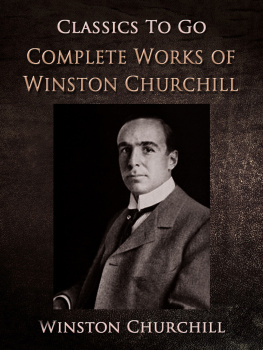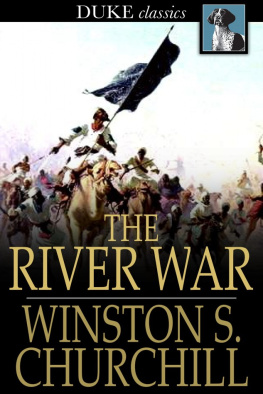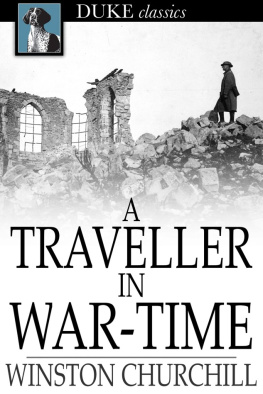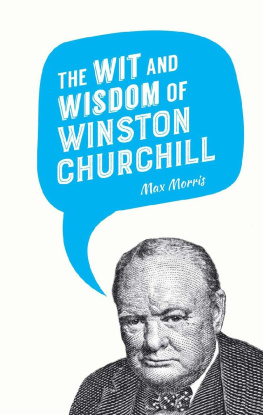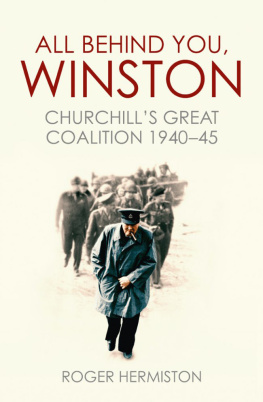Churchill Winston - Darkest hour: how Churchill brought England back from the brink
Here you can read online Churchill Winston - Darkest hour: how Churchill brought England back from the brink full text of the book (entire story) in english for free. Download pdf and epub, get meaning, cover and reviews about this ebook. City: England;Great Britain, year: 2017, publisher: HarperCollins;Harper Perennial, genre: Non-fiction. Description of the work, (preface) as well as reviews are available. Best literature library LitArk.com created for fans of good reading and offers a wide selection of genres:
Romance novel
Science fiction
Adventure
Detective
Science
History
Home and family
Prose
Art
Politics
Computer
Non-fiction
Religion
Business
Children
Humor
Choose a favorite category and find really read worthwhile books. Enjoy immersion in the world of imagination, feel the emotions of the characters or learn something new for yourself, make an fascinating discovery.
- Book:Darkest hour: how Churchill brought England back from the brink
- Author:
- Publisher:HarperCollins;Harper Perennial
- Genre:
- Year:2017
- City:England;Great Britain
- Rating:5 / 5
- Favourites:Add to favourites
- Your mark:
- 100
- 1
- 2
- 3
- 4
- 5
Darkest hour: how Churchill brought England back from the brink: summary, description and annotation
We offer to read an annotation, description, summary or preface (depends on what the author of the book "Darkest hour: how Churchill brought England back from the brink" wrote himself). If you haven't found the necessary information about the book — write in the comments, we will try to find it.
Churchill Winston: author's other books
Who wrote Darkest hour: how Churchill brought England back from the brink? Find out the surname, the name of the author of the book and a list of all author's works by series.
Darkest hour: how Churchill brought England back from the brink — read online for free the complete book (whole text) full work
Below is the text of the book, divided by pages. System saving the place of the last page read, allows you to conveniently read the book "Darkest hour: how Churchill brought England back from the brink" online for free, without having to search again every time where you left off. Put a bookmark, and you can go to the page where you finished reading at any time.
Font size:
Interval:
Bookmark:
Over the years, my bookshelves have always held a few volumes whose subject could broadly be called Great Speeches That Changed the World. The thesis of these books is that this questionable feat has been achieved multiple times, under the right conditions: timely words, alloyed to a timely idea, spoken by a timely, brilliant person.
In these anthologies I could expect to find at least one speech by Winston Spencer Churchill. Often two or three. They sounded slightly old-fashioned, lofty, with his wordsmithery elevated to near pomposity, yet always they contained a brace of exquisite phrases, superb sound-bites that would have been just as memorable to an audience 1,000 years in the past as 1,000 years in the future.
As I became a minor student of the speeches of Nehru, Lenin, George Washington, Hitler, Martin Luther King and others, I fed my admiration for the art of oratory and these mens rising arrow-showers of words. At their best they had the power to summon into being the unexpressed thoughts of a people, to galvanize disparate emotions into a locus of shared passion capable of making the unthinkable a reality.
What struck me as remarkable about Churchill was that he wrote three of these speeches within just four weeks. For him, May 1940 was a single span of inspired grandiloquence. And he did so all by himself. What was it about that moment that spurred him to such heights? What political and personal pressures compelled him, three times in so few days, to turn coal into such diamonds?
The simple answer? Britain was at war. The horrors of Blitzkrieg saw one European democracy after another fall in rapid succession to the Nazi boot and shell. Facing this horror, with pen in hand and typist-secretary at the ready, Britains new Prime Minister wondered what words could rouse the country to a heroic resistance when the invasion of the country by a terrible foe seemed mere hours away.
This book, and the screenplay for the film Darkest Hour, emerged from these questions and from this fascination. The aim is to look at the working methods, leadership qualities, thinking and psychological states of one man in these critical days a man who believed, in the core of his rather poetic soul, that words mattered, that they counted, and could intercede to change the world.
My initial research led me to focus on the period from Churchills unexpected promotion to the prime ministership on 10 May 1940 until the near-complete evacuation of the endangered British army from Dunkirk (which signalled the imminent fall of France) on 4 June the date, by the way, on which he delivered the last speech in his rhetorical trilogy.
The National Archives provided a vital research tool: access to the actual minutes of the War Cabinet meetings that Winston chaired during those dimming days. These shed light on a rare period of uncertainty in his career, a wobble in his otherwise steady leadership. Pedestals are for statues, not for people, and a close reading of the minutes reveals not only a leader in trouble, under attack from all sides and uncertain at times what direction to take, but also a story I had not heard: of a British War Cabinet that, had it made peace with the enemy, would have reshaped the world for ever. How close did Winston come to entering into a peace deal with Hitler? Dangerously so, I discovered.
The question before that War Cabinet, gathering in 1940 initially at the Admiralty (a short walk up Whitehall from Downing Street) and thereafter in its bunker deep under the Treasury Building, was whether Britain was to fight on alone, perhaps to the destruction of its armed forces and even the nation itself, or play it safe by exploring a peace deal with Hitler. The Italian Ambassador in London, in exchange for some colonial trades in Africa and Malta and Gibraltar, had indicated he was prepared to ask the Italian fascist leader, Benito Mussolini, to act as the go-between for Berlin and London in such a deal. With Winstons rival for the leadership, Lord Halifax, emphatic in his call for this option to be explored, at least until Hitlers terms could be discerned, and with Winstons predecessor as PM, Neville Chamberlain, agreeing that this seemed the only sensible way to escape almost certain annihilation, Winston faced some very lonely hours in which he truly had only his own counsel to draw upon.
Many readers will be astonished to learn that the great Winston Churchill, presented to history as a staunch and unyielding foe of Hitler, told his colleagues in the War Cabinet that he would not object in principle to peace talks with Germany if Herr Hitler was prepared to make peace on terms of the restoration of German colonies and the overlordship of Central Europe. At one point, on 26 May, he went further, and was reported to have stated that he would be thankful to get out of our present difficulties, provided we retained the essentials of our vital strength, even at the cost of some cession of territory. What territory? Not only European, but British territory. And there was more. Chamberlains diary for 27 May records that Churchill told the War Cabinet that if we could get out of this jam by giving up Malta and Gibraltar and some African colonies he [Winston] would jump at it.
Was Churchill seriously considering entering into peace talks with a homicidal maniac whom he loathed beyond all others? It would seem so. Such were the pressures upon him that he not only entertained the idea but permitted Halifax to begin drafting a top-secret memorandum to the Italians, laying out Britains terms and taking the first step in a process to find out how severe Hitlers would be.
For those who might find that any image of a Churchill willing to seriously consider such a deal belittles the great man, doing injury to his reputation, I would argue the opposite: that the public image of a pugnacious battler who never doubted himself does not do him justice; it makes him unreal, a clich, less a three-dimensional human being than the product of a collective dream. Rather than diminish him, his indecision, his ability to put on a strong face in order to keep morale up while thinking of different solutions, recommends him.
These, then, are the dark hours to which the title refers, but from them and, moreover, because of them Churchill emerged with two coups de thtre, magnificent examples of peroration: the first delivered to a group of outer Cabinet members not privy to the War Cabinet talks, and the second to the full Parliament for all the world to hear. The first was a warm-up for the real thing, and no full record of it exists, but diary entries by two men who heard it suggest its broad outlines and many key phrases. The second speech entered history the moment the words came out of Winstons mouth, as he listed beaches, landing grounds, fields, hills, seas and oceans, and the air as the places where the British would fight the dreaded Hun.
In both these speeches, and in an earlier one delivered a few weeks before in which he promised the public his blood, toil, tears and sweat, whether they wanted them or not he used every trick in the book. These were lessons hed learned from the Greeks and Romans generally, and Cicero specifically: first arousing sympathy for his country, himself, his clients, his case, and then building towards a direct emotional appeal what the Roman orators called epilogos aimed at leaving not a heart unmoved or a dry eye in the house.
Models exist for the kind of fireworks he delivered three times in May and early June 1940 notably the speech of Marcus Antonius in defence of Aquillius, during which Antonius tore open the tunic of Aquillius to reveal his battle scars but the British House of Commons and the British public had heard nothing like it. With words, Churchill changed the political mood and shored up the nervous will of a shaking people, compelling them down an uncertain road thateventually, and against the odds, and with all the sacrifice Winston predicted (and then some!) ended in total victory.
Font size:
Interval:
Bookmark:
Similar books «Darkest hour: how Churchill brought England back from the brink»
Look at similar books to Darkest hour: how Churchill brought England back from the brink. We have selected literature similar in name and meaning in the hope of providing readers with more options to find new, interesting, not yet read works.
Discussion, reviews of the book Darkest hour: how Churchill brought England back from the brink and just readers' own opinions. Leave your comments, write what you think about the work, its meaning or the main characters. Specify what exactly you liked and what you didn't like, and why you think so.







